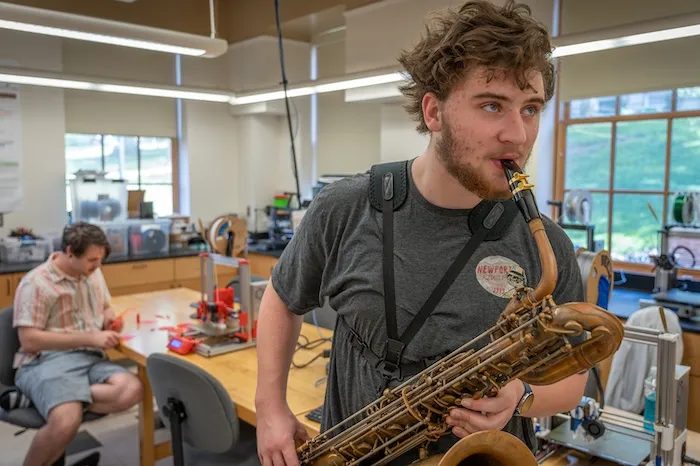
It’s not every day that a baritone saxophone is heard from the first floor of the Rickey Science Center, but the short song that Kellen Franks ’27 played was a perfect example of the type of research and experiential education highlighted by Marietta’s annual All Scholars Day.
Franks and fellow students who took Dr. Craig Howald’s DIY Manufacture course showcased a variety of items they created in the Physics Makerspace, inviting students and employees to see the potential of 3D printing. Franks, an Applied Physics and Music double major, printed a saxophone reed and played the popular snippet from “Tequila,” by The Champs.
“Professor Howald asked us to come up with quick print designs so I thought this would be a good way to use the 3D software and then demonstrate its use,” Franks said.
Like the items featured in the Physics Makerspace, the 14th annual All Scholars Day showcased student research and creative works and allowed the entire campus to learn from and celebrate that work.
“Today is the celebratory finale of the research and creative work that our students have done,” said McCoy Professor of Biochemistry Suzanne Parsons, who organizes All Scholars Day. “One of the other professors said to me that our students are not only knowledgeable in their field, but they also have really strong presentation and communication skills. I always tell my students to save these presentations because a future employer or a graduate school may ask them to give a 10- or 15-minute presentation on a topic they’re interested in, and these projects would definitely impress any interviewer.”
Students not participating in research attended sessions for a variety of reasons. Health Science major Mia Williams ’27 attended oral presentations but also stopped by the Physics Makerspace because she has an interest in using 3D printing technology as a career.
“I actually took a 3D printing class when I was in high school and I made a 3D printed prosthetic for a science project,” she said.
Howald said the DIY Manufacturing course, as well as featuring some of the items created by students in the makerspace, expanded students’ ideas for 3D printer applications.
“All the printers in (the makerspace) have been built by students, with the exception of two commercial ones — built, assembled, tested and improved by students taking the course,” Howald said.
In the Brown Petroleum Building, a student group made up of Colby Pasour ’24, Zach Brown ’24, Logan Podgorski ’24 and Cory Hart ’24 presented their capstone project, “Not Your Father’s Oil,” to fellow Petroleum Engineering and Geology students, faculty and guests. Theirs was one of three petroleum engineering capstones presented in Brown Thursday morning.
“We took information from a Marietta field, and we used that information to build a full field development, from drilling all the way to production facilities,” Brown said. “Being a part of these types of presentations and being able to see other students doing them really shows what internships can do because we used a lot of our information and numbers from past internships. (All Scholars Day) also really helped me prepare for this year’s project because I went to the capstone presentations last year and saw how other students presented their work, so you get to learn from both sides.”
Actuarial Science major Lily Sorenson ’25 was one of 102 poster presentations set up in Dyson Baudo Recreation Center, and featured her research project, “A Statistical Analysis of Mental Toughness in Backyard Marathons,” which grew from a project originated from last year’s research by Lexi Jobe ’23. The research examined men and women who participated in a subset of ultramarathon racing that involved running a four-mile loop within one hour repeatedly until there is only one runner left.
“There are two ways to drop out of this race: you either don’t finish that loop within the hour — so you DNF (Did Not Finish) — or you RTC (Refuse To Continue), where you finish the loop on time but decide to stop running,” Sorenson said. “We were looking to see if there was a difference in mental toughness between those people who DNF and RTC and then also between males and females. We ultimately found that, across the board, there was no statistical difference in mental toughness.”
The topic was inspired by Assistant Professor of Mathematics Michelle Jeitler, who is an ultramarathoner.
“I am unbelievably proud of her,” Jeitler said. “Lily presented this poster at a national conference a few weeks ago — the National Council for Undergraduate Conference in Long Beach, California. I didn’t think I could be prouder of her, but I am.”
Sorenson was grateful for the guidance and support that Jeitler provided to her throughout the research process.
“I couldn’t have done this without her,” Sorenson said. “She has encouraged me and really inspired the research I was able to do.”